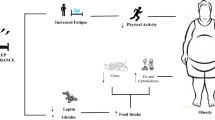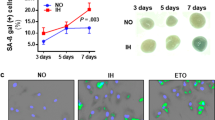Abstract
Background:
Short sleep has been implicated in higher risk of obesity in humans, and is associated with insulin resistance. However, the effects of fragmented sleep (SF) rather than curtailed sleep on glucose homeostasis are unknown.
Methods:
Wild-type and NADPH oxidase 2 (Nox2) null male mice were subjected to SF or sleep control conditions for 3 days to 3 weeks. Systemic and visceral adipose tissue (VAT) insulin sensitivity tests, glucose tolerance test, fluorescence-activated cell sorting and immunohistochemistry for macrophages and its sub-types (M1 and M2), and Nox expression and activity were examined.
Results:
Here we show that SF in the absence of sleep curtailment induces time-dependent insulin resistance, in vivo and also in vitro in VAT. Oxidative stress pathways were upregulated by SF in VAT, and were accompanied by M1 macrophage polarization. SF-induced oxidative stress, inflammation and insulin resistance in VAT were completely abrogated in genetically altered mice lacking Nox2 activity.
conclusions:
These studies imply that SF, a frequent occurrence in many disorders and more specifically in sleep apnea, is a potent inducer of insulin resistance via activation of oxidative stress and inflammatory pathways, thereby opening the way for therapeutic strategies.
This is a preview of subscription content, access via your institution
Access options
Subscribe to this journal
Receive 12 print issues and online access
$259.00 per year
only $21.58 per issue
Buy this article
- Purchase on Springer Link
- Instant access to full article PDF
Prices may be subject to local taxes which are calculated during checkout





Similar content being viewed by others
References
Spiegel K, Leproult R, Van Cauter E . Impact of sleep debt on metabolic and endocrine function. Lancet 1999; 354: 1435–1439.
Tasali E, Leproult R, Ehrmann DA, Van Cauter E . Slow-wave sleep and the risk of type 2 diabetes in humans. Proc Natl Acad Sci USA 2008; 105: 1044–1049.
Morselli L, Leproult R, Balbo M, Spiegel K . Role of sleep duration in the regulation of glucose metabolism and appetite. Best Pract Res Clin Endocrinol Metab 2010; 24: 687–702.
Buxton OM, Pavlova M, Reid EW, Wang W, Simonson DC, Adler GK . Sleep restriction for 1 week reduces insulin sensitivity in healthy men. Diabetes 2010; 59: 2126–2133.
Pejovic S, Vgontzas AN, Basta M, Tsaoussoglou M, Zoumakis E, Vgontzas A et al. Leptin and hunger levels in young healthy adults after one night of sleep loss. J Sleep Res 2010; 19: 552–558.
Buxton OM, Cain SW, O'Connor SP, Porter JH, Duffy JF, Wang W et al. Adverse metabolic consequences in humans of prolonged sleep restriction combined with circadian disruption. Sci Transl Med 2012; 4: 129ra43.
Stamatakis KA, Punjabi NM . Effects of sleep fragmentation on glucose metabolism in normal subjects. Chest 2010; 137: 95–101.
Gonnissen HK, Hursel R, Rutters F, Martens EA, Westerterp-Plantenga MS . Effects of sleep fragmentation on appetite and related hormone concentrations over 24 h in healthy men. Br J Nutr 2012; 8: 1–9.
Lambeth JD . NOX enzymes and the biology of reactive oxygen. Nat Rev Immunol 2004; 4: 181–189.
Bedard K, Krause KH . The NOX family of ROS-generating NADPH oxidases: physiology and pathophysiology. Physiol Rev 2007; 87: 245–313.
Nair D, Zhang SX, Ramesh V, Hakim F, Kaushal N, Wang Y et al. Sleep fragmentation induces cognitive deficits via nicotinamide adenine dinucleotide phosphate oxidase-dependent pathways in mouse. Am J Respir Crit Care Med 2011; 184: 1305–1312.
Ramesh V, Nair D, Zhang SX, Hakim F, Kaushal N, Kayali F et al. Disrupted sleep without sleep curtailment induces sleepiness and cognitive dysfunction via the tumor necrosis factor-α pathway. J Neuroinflammation 2012; 9: 91.
Bouloumié A, Casteilla L, Lafontan M . Adipose tissue lymphocytes and macrophages in obesity and insulin resistance: makers or markers, and which comes first? Arterioscler Thromb Vasc Biol 2008; 28: 1211–1213.
Nishimura S, Manabe I, Nagasaki M, Seo K, Yamashita H, Hosoya Y et al. In vivo imaging in mice reveals local cell dynamics and inflammation in obese adipose tissue. J Clin Invest 2008; 118: 710–721.
Donga E, van Dijk M, van Dijk JG, Biermasz NR, Lammers GJ, van Kralingen KW et al. A single night of partial sleep deprivation induces insulin resistance in multiple metabolic pathways in healthy subjects. J Clin Endocrinol Metab 2010; 95: 2963–2968.
Vijay R, Kaushal N, Gozal D . Sleep fragmentation differentially modifies EEG delta power during slow wave sleep in socially isolated and paired mice. Sleep Sci 2009; 2: 64–75.
Veasey SC, Yeou-Jey H, Thayer P, Fenik P . Murine multiple sleep latency test: phenotyping sleep propensity in mice. Sleep 2004; 27: 388–393.
Carreras A, Kayali F, Zhang J, Hirotsu C, Wang Y, Gozal D . Metabolic effects of intermittent hypoxia in mice: steady versus high-frequency applied hypoxia daily during the rest period. Am J Physiol Regul Integr Comp Physiol 2012; 303: R700–R709.
Sargis RM, Neel BA, Brock CO, Lin Y, Hickey AT, Carlton DA et al. The novel endocrine disruptor tolylfluanid impairs insulin signaling in primary rodent and human adipocytes through a reduction in insulin receptor substrate-1 levels. Biochim Biophys Acta 2012; 1822: 952–960.
Broussard JL, Ehrmann DA, Van Cauter E, Tasali E, Brady MJ . Impaired insulin signaling in human adipocytes after experimental sleep restriction. A randomized, crossover study. Ann Intern Med 2012; 157: 549–557.
Nedeltcheva AV, Kessler L, Imperial J, Penev PD . Exposure to recurrent sleep restriction in the setting of high caloric intake and physical inactivity results in increased insulin resistance and reduced glucose tolerance. J Clin Endocrinol Metab 2009; 94: 3242–3250.
Kumari M, Badrick E, Ferrie J, Perski A, Marmot M, Chandola T . Self reported sleep duration and sleep disturbance are independently associated with cortisol secretion in the Whitehall II study. J Clin Endocrinol Metab 2009; 94: 4801–4809.
Fantus IG, Ryan J, Hizuka N, Gorden P . The effect of glucocorticoids on the insulin receptor: an in vivo and in vitro study. J Clin Endocrinol Metab 1981; 52: 953–960.
Marangou AG, Alford FP, Ward G, Liskaser F, Aitken PM, Weber KM et al. Hormonal effects of norepinephrine on acute glucose disposal in humans: a minimal model analysis. Metabolism 1988; 37: 885–891.
Tobaldini E, Cogliati C, Fiorelli EM, Nunziata V, Wu MA et al. One night on-call: sleep deprivation affects cardiac autonomic control and inflammation in physicians. Eur J Intern Med 2013. e-pub ahead of print 16 April 2013; doi: 10.1016/j.ejim.2013.03.011.
Reynolds AC, Dorrian J, Liu PY, Van Dongen HP, Wittert GA et al. Impact of five nights of sleep restriction on glucose metabolism, leptin and testosterone in young adult men. PLoS One 2012; 7: e41218.
Houstis N, Rosen ED, Lander ES . Reactive oxygen species have a causal role in multiple forms of insulin resistance. Nature 2006; 440: 944–948.
Weisberg SP, McCann D, Desai M, Rosenbaum M, Leibel RL, Ferrante Jr AW . Obesity is associated with macrophage accumulation in adipose tissue. J Clin Invest 2003; 112: 1796–1808.
Xu H, Barnes GT, Yang Q, Tan G, Yang D, Chou CJ et al. Chronic inflammation in fat plays a crucial role in the development of obesity-related insulin resistance. J Clin Invest 2003; 112: 1821–1830.
Di Gregorio GB, Yao-Borengasser A, Rasouli N, Varma V, Lu T, Miles LM et al. Expression of CD68 and macrophage chemoattractant protein-1 genes in human adipose and muscle tissues: association with cytokine expression, insulin resistance, and reduction by pioglitazone. Diabetes 2005; 54: 2305–2313.
Vgontzas AN, Zoumakis E, Bixler EO, Lin HM, Follett H et al. Adverse effects of modest sleep restriction on sleepiness, performance, and inflammatory cytokines. J Clin Endocrinol Metab 2004; 89: 2119–2126.
Mullington JM, Simpson NS, Meier-Ewert HK, Haack M . Sleep loss and inflammation. Best Pract Res Clin Endocrinol Metab 2010; 24: 775–784.
Lumeng CN, Del Proposto JB, Westcott DJ, Saltiel AR . Phenotypic switching of adipose tissue macrophages with obesity is generated by spatiotemporal differences in macrophage subtypes. Diabetes 2008; 57: 3239–3246.
Acknowledgements
DG is supported by National Institutes of Health grants HL65270 and HL86662. AK and SXLZ were supported by Comer Kids Classic grants.
Author contributions
SXLZ and AK performed the experiments and analyzed the data. YW conducted the experiments, analyzed the data, drafted portions of the manuscript and served as blinded observer. AC and FH performed GTT and ITT assays. AC and CH performed sleep recordings. BAN and MJB assisted with technical aspects of adipose tissue insulin sensitivity assays. ZQ performed the experiments, particularly immunohistochemistry. DG provided the conceptual design of the project, analyzed the data, drafted the manuscript and is responsible for the financial support of the project and the manuscript content. All authors have reviewed and approved the final version of the manuscript. DG is supported by National Institutes of Health grants HL-65270, HL-086662 and HL-107160. Dr Gozal is the guarantor of this work, had full access to all the data and takes full responsibility for the integrity of data and the accuracy of data analysis.
Author information
Authors and Affiliations
Corresponding author
Ethics declarations
Competing interests
The authors declare no conflict of interest.
Rights and permissions
About this article
Cite this article
Zhang, S., Khalyfa, A., Wang, Y. et al. Sleep fragmentation promotes NADPH oxidase 2-mediated adipose tissue inflammation leading to insulin resistance in mice. Int J Obes 38, 619–624 (2014). https://doi.org/10.1038/ijo.2013.139
Received:
Revised:
Accepted:
Published:
Issue Date:
DOI: https://doi.org/10.1038/ijo.2013.139
Keywords
This article is cited by
-
Mitochondrial transplantation: opportunities and challenges in the treatment of obesity, diabetes, and nonalcoholic fatty liver disease
Journal of Translational Medicine (2022)
-
Short sleep duration and cardiometabolic risk: from pathophysiology to clinical evidence
Nature Reviews Cardiology (2019)
-
Acute exposure to nocturnal train noise induces endothelial dysfunction and pro-thromboinflammatory changes of the plasma proteome in healthy subjects
Basic Research in Cardiology (2019)
-
Sleep-disordered breathing, circulating exosomes, and insulin sensitivity in adipocytes
International Journal of Obesity (2018)
-
Intermittent hypoxia causes NOX2-dependent remodeling of atrial connexins
BMC Cell Biology (2017)



